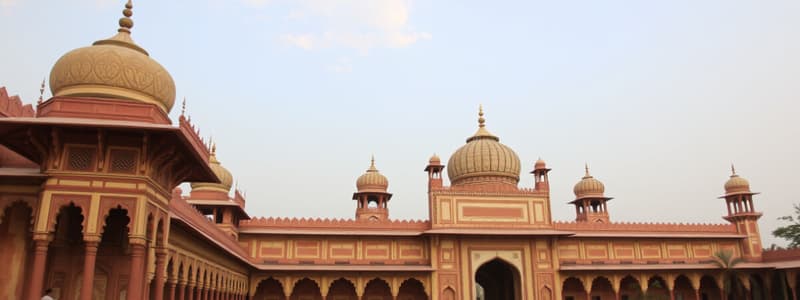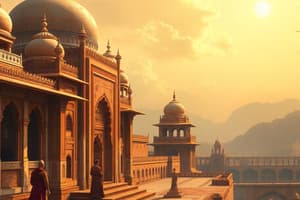Podcast
Questions and Answers
What significant influence did the Mughal Empire have on Indian society?
What significant influence did the Mughal Empire have on Indian society?
- Promotion of only Hindu cultural practices
- Elimination of conflict among various kingdoms
- Creation of deep social divisions (correct)
- Unification of all regional languages
What event preceded the rise of the Mughal Empire in India?
What event preceded the rise of the Mughal Empire in India?
- The construction of the Taj Mahal
- Invasions by Huns from Central Asia (correct)
- A long period of peace among Indian kingdoms
- The establishment of the Gupta Empire
What was the primary impact of Sultan Mahmud of Ghazni's campaigns on India?
What was the primary impact of Sultan Mahmud of Ghazni's campaigns on India?
- It resulted in the establishment of a flourishing trade network.
- It strengthened the native Indian kingdoms.
- It left the region weakened and vulnerable to further conquests. (correct)
- It facilitated the spread of Hinduism across the region.
What characterized the rule of the sultans of the Delhi Sultanate over the Hindus?
What characterized the rule of the sultans of the Delhi Sultanate over the Hindus?
Which event signifies the decline of Delhi prior to its reconstruction in the 16th century?
Which event signifies the decline of Delhi prior to its reconstruction in the 16th century?
During which centuries did the Delhi Sultanate experience rule by 33 different sultans?
During which centuries did the Delhi Sultanate experience rule by 33 different sultans?
What was the geographical extent of Muslim advance in India prior to the campaigns of Sultan Mahmud of Ghazni?
What was the geographical extent of Muslim advance in India prior to the campaigns of Sultan Mahmud of Ghazni?
What type of political structure was the Delhi Sultanate characterized by?
What type of political structure was the Delhi Sultanate characterized by?
In what manner did Timur the Lame's conquest alter the state of Delhi?
In what manner did Timur the Lame's conquest alter the state of Delhi?
What significant change occurred in the leadership of India in the 16th century?
What significant change occurred in the leadership of India in the 16th century?
Flashcards are hidden until you start studying
Study Notes
Mughal Empire Overview
- The Mughal Empire united Turks, Persians, and Indians across Southern Asia, profoundly impacting the region’s culture and politics.
- Social divisions and artistic legacies established during the empire still affect contemporary India.
Historical Context
- The Gupta Empire fell around the late 400s due to invasions by Central Asian Huns.
- From the 700s onwards, various Muslim tribes from Central Asia fragmented Northwestern India into smaller kingdoms.
Rise of the Mughals
- The Mughals, meaning "Mongols," descended from Timur the Lame and Genghis Khan.
- For 300 years, Muslim forces advanced only to the Indus River Valley, facing resistance from local Hindu kingdoms.
- Beginning around 1000 AD, Turkish armies, led by Sultan Mahmud of Ghazni, conducted destructive campaigns throughout India.
Delhi Sultanate
- Between the 13th and 16th centuries, the Delhi Sultanate saw the rise and fall of 33 rulers from Delhi.
- Timur the Lame devastated Delhi in 1398, leaving it desolate for months.
- Delhi was eventually rebuilt but remained politically unstable until the emergence of a strong unifying leader.
Babur and the Founding of the Mughal Empire
- Babur, a young prince, inherited a small kingdom in Uzbekistan at age 11, later establishing a formidable army.
- In 1526, he defeated a much larger Sultanate army of Delhi, marking the beginning of the Mughal Empire.
- After Babur's death, his son Humayun struggled to maintain control over the territory he had gained.
Akbar’s Reign
- Akbar, Babur's grandson, ruled from 1556 to 1605 and is renowned for his wisdom and tolerance.
- He recognized military might as essential for stability and governance, solidifying his reign through strategic conquests and alliances.
Cultural Impact
- The Mughal Empire left a lasting legacy in art, architecture (notably the Taj Mahal), and continued cultural fusion between Hindus and Muslims in South Asia.
Studying That Suits You
Use AI to generate personalized quizzes and flashcards to suit your learning preferences.




